
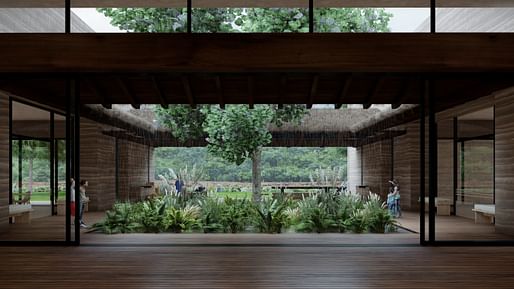
The second series of the Children's Hospice design competition has awarded three winning design proposals from student teams based in Japan, Mexico, and Denmark. The 2023 award winners responded to the competition brief asking participants to "create designs for a place that can give more support to children and their families facing a terminal illness." This year's jury selected design proposals that offered "respite, recuperation and receive support in whatever form they may need it while they are battling their illness."
Buildner, the competition's organizer, added, "While this was an architecture ideas competition, the brief requested a few key functions for the conceptual hospice, including a common area with a gathering room, a games or playroom, a small library, a Chapel, a kitchen and dining room, as well as a private area which could function as a nurse’s room and therapy room for psychological support. There was no defined location chosen for this competition, and participants were requested to select a theoretical site from their home country."
Explore each winning project below.
1st PRIZE & BUILDNER STUDENT AWARD
Sympiosis by Miku Yashiki
Yuta Sugasawa of Waseda University (Japan)
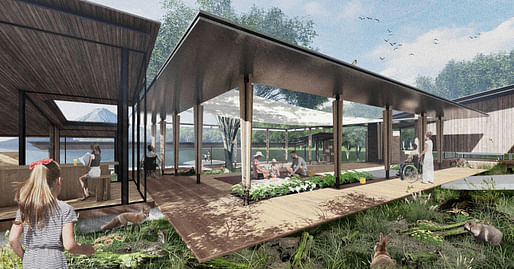
Jury response: "The project makes use of two primary renderings which communicate the project’s overall form at an aerial level, as well as from a user perspective. The text would benefit from being broken into shorter paragraphs highlighting the three main points: site information, the importance of nature, and the architectural solution for connections with nature. The line drawings, while complex and elegant, are quite monotone and it is thus difficult for a reader to differentiate the various information contained within them. It is recommended that the author use more varied line weights and colors. The presentation would also greatly benefit from additional annotation on the renderings and site section."
2ND PRIZE WINNER
Huitzilin - a home in the jungle by Antonio García de la Mora Sebastian Tellez Solís Pablo Navarro Rubio Montserrat Sanchez Villaseñor of the Unviersidad Anáhuac Querétaro (Mexico)
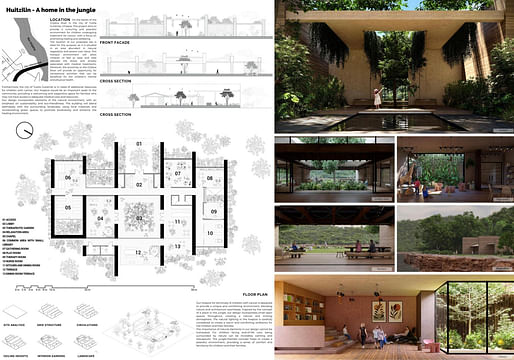
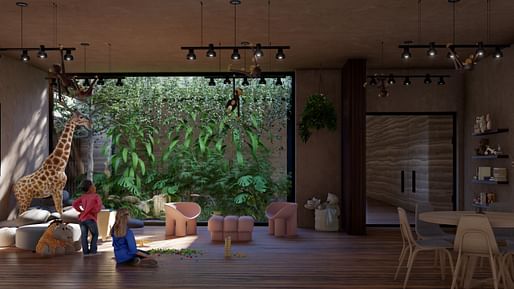
Jury response: "Huitzilin is a proposal for a project sited on the banks of the Grijalva River in the city of Tuxtia Gutierrez, Chiapas. The project aims to provide a nurturing and peaceful environment for children undergoing treatment for cancer, with a focus on promoting healing and wellbeing. The site is located in an area of abundant vegetation and river views, chosen for its tranquil environment and connections with nature to alleviate stress and anxiety, as well as for its opportunity for recreational activities that might be beneficial for users’ mental and physical health. The plan is organized by a series of parallel rammed earth walls, designed to blend with nature and provide natural lighting from two sides, as well as through clerestories and openings in the roof above."
3RD PRIZE WINNER
Pallio by Iaroslava Komissarova of Aarhus School of Architecture and Ivan Beketov MARHI alumn (Denmark)
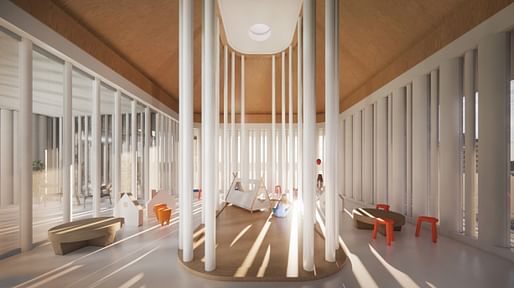
Jury response: "Pallio is a proposal for a hospice that functions as a piece of urban infrastructure that accounts for the needs of both its users and neighbors. It is sited near to the Copenhagen Central Hospital and an existing cultural building, strategically placed to make it visible and affordable for its users. The design of the hospice is intended to be humane and inclusive. Its dynamic form integrates a central courtyard, and a mix of public and private spaces connected to the city. Drawing from the term ‘palliative’ which in Latin derives from a word meaning ‘to cloak’, the building’s many spaces are enveloped with a delicate roof system, symbolizing a consistent form of protection for its users."
BUILDNER SUSTAINABILITY AWARD
The Meadow by André Dupont, Agata Tyburska, and Nisanur Akkaya of Aalborg University (Denmark)
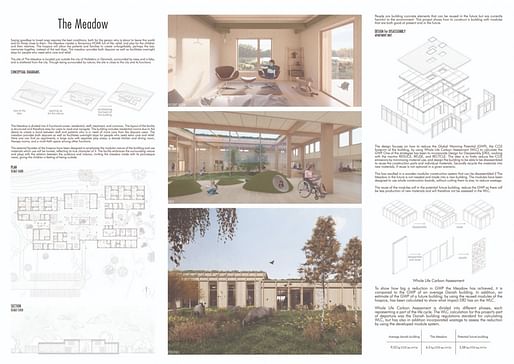
Jury Response: "The Meadow is designed to perform as a temporary home full of life, relief and play for children and their families. It is a proposal for a hospice located near to the city of Holstebro, Denmark for urban connectivity, yet in a suburban area where it is surrounded by trees and a lake. The project is divided into four functional zones – residential, staff, treatment and common spaces – and organized according to a plan that is simple and easy to navigate. The external facades of the building are designed to emphasize modularity and use natural, honest materials. Its authors point to considerations of carbon footprint as well as design for disassembly: the design makes use of a wooden modular construction system of factory-made construction boards that are not cut to size, in an effort to reduce waste and increase reusability."
Explore this year's award-winning teams, projects, and shortlisted proposals here.

MICROHOME Kingspan 2024/25
Register by Thu, Feb 13, 2025
Submit by Tue, Mar 18, 2025
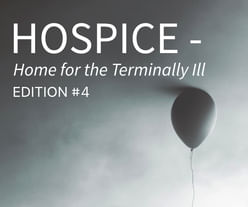
Hospice - Home for Terminally Ill #4
Register by Wed, Jan 15, 2025
Submit by Mon, Jun 16, 2025
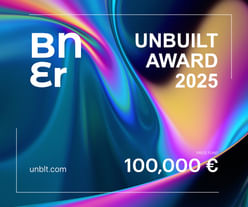
100,000 € Prize / Buildner's Unbuilt Award 2025
Register by Thu, Oct 30, 2025
Submit by Thu, Nov 20, 2025
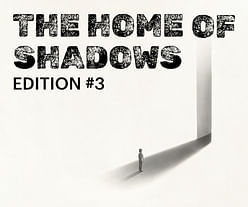
The Home of Shadows / Edition #3
Register by Wed, Jan 29, 2025
Submit by Mon, Mar 3, 2025
No Comments